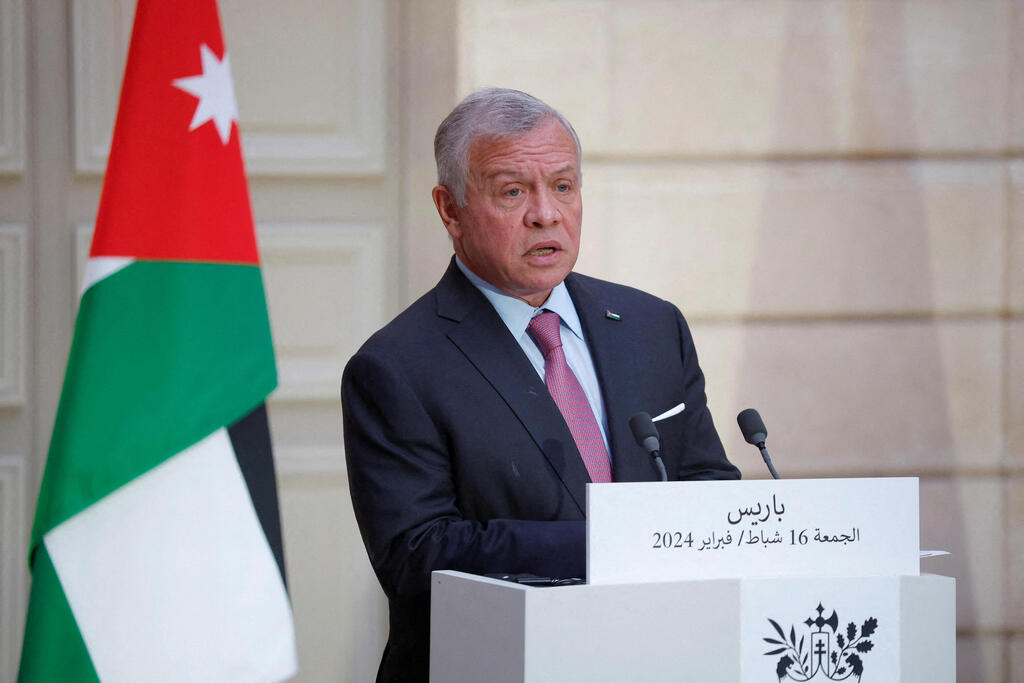Jordan is a ticking bomb. Israelis love quiet, and we all find it comfortable not to probe too deeply into what’s happening in the kingdom that safeguards our eastern border — Israel’s longest border with any next-door neighbor.
Beyond that kingdom, an ocean of threats, hostility and chaos extends. We find it comfortable to believe that the king, despite occasional unfriendly statements, will be sure to do whatever needs doing in order to maintain quiet.
But the king’s throne, which in any case hasn’t always excelled in stability, is wobbling. And that wobble is growing stronger by the day. The instability threatens to undermine security not only in Jordan but throughout the Middle East. The troubles of the Hashemite kingdom are also the troubles of Israel, and the Israeli public only partly realizes what’s eating away at the foundations of the monarchy.
The first reason for the Hashemite regime’s fragility derives from the kingdom’s large refugee population. In 1948, there were 400,000 people in Jordan and today there are 11.5 million, including many refugees. That growth has come mainly from enormous waves of immigration. Immigration from where? After the 2003 invasion of Iraq, many refugees arrived in Jordan from the east. Tens of thousands of Iraqi refugees are estimated to still reside in Jordan, but today their numbers are small in comparison with the Syrian and Palestinian refugees.
A huge number of refugees fled into Jordan from the Syrian civil war that began in 2011. According to figures from the UN High Commissioner for Refugees, some 670,000 Syrian refugees are registered in Jordan; but according to unofficial estimates, those refugees could even number a million or so.
Besides accommodating “new” refugees, Jordan has housed Palestinian refugees since 1948. How many? The Hashemite regime has an interest in concealing the actual number, so it isn’t clear. But out of 11.5 million Jordanian citizens in all, the Palestinian population is estimated to total at least 3.5 million. And along with all those refugees, Jordan also hosts refugees and immigrant workers from countries such as Yemen, Sudan and Egypt.
Given shelter in times of trouble, asylum seekers might be expected to show gratitude. But not necessarily. The flood of foreigners in Jordan is under incitement from various ideological and political sources aiming to topple the Hashemite dynasty and take over the kingdom.
Given shelter in times of trouble, asylum seekers might be expected to show gratitude. But not necessarily. The flood of foreigners in Jordan is under incitement from various ideological and political sources, each with its own motivation to topple the Hashemite dynasty and take over the kingdom.
The Muslim Brotherhood’s ideology, for example, has won great sympathy among Jordan’s large Palestinian sector. It’s the same ideology that’s shared by Hamas and that inspired the assassination of President Sadat in Egypt. Moreover, Iran is of course also troubling the waters and creating great pressure by way of Iraq and Syria at the borders of the kingdom. So Jordan has changed from a country adjoining territories such as an American-dominated Iraq to a country adjoining Iranian proxy organizations — all this at a time when the King’s loyal Bedouin minority is waging tough domestic battles that ruinously weaken it.
The volume of weapons smuggled from Iran into the West Bank area, and even into Israel proper, results directly from the Jordanian army’s inaction.
Israel can already distinctly feel the effects of the Jordanian government’s weakness. The volume of weapons smuggled from Iran into the West Bank area, and even into Israel proper, is a direct consequence of the Jordanian army’s weakness. And the Iranian–Palestinian effort to mount terror attacks against Israel, such as the one at the Allenby Bridge Crossing, is no less a consequence. Sensing weakness, the Iranian octopus is focusing considerable effort on turning Jordan into one more proxy of the Ayatollahs, like Yemen, Iraq, Syria and Lebanon.
 Amir Avivi Photo: DANIEL 'STRAVO
Amir Avivi Photo: DANIEL 'STRAVOIf Iran succeeds in its plan for Jordan, there’s no need to explain what a serious challenge Israel will face. The question now is how to confront that security challenge in its present form, because it threatens to turn into a serious headache before long. The first thing to do is to beef up the relatively scanty Israeli forces in the Jordan Valley and the Arava. In addition, a network of meaningful obstacles should be set up, centered around a barrier like the one at the Egyptian border.
The sphere of economics is also critical to our eastern neighbor’s stability. So Israel should continue following through on programs that are now partially in effect, such as the economic corridor that crosses Jordan eastward to India, the Sea-to-Sea Project and increased industrial and agricultural cooperation. Remember that Jordan relies heavily on Israel for energy. And the supply of water to the East Bank rests on agreements between Amman and Jerusalem.
Granted, anti-Israeli statements are heard more than rarely from east of the river. The relationship has known ups and downs and it isn’t all rosy today. But diplomatic and geopolitical strategy requires cool consideration in view of the alternatives, rather than emotionally colored thinking.
It’s important to bear in mind that not everything depends only on us. Jordan is an independent country, with complicated internal dynamics that Israel can influence only so far. But Israel has helped the Hashemites more than once to stay on the throne. The best-remembered example was during Black September, when King Hussein was facing substantial danger and Israel threatened to step in against any Syrian invasion of Jordan. Granted, anti-Israeli statements are heard more than rarely from east of the river. The relationship has known ups and downs and it isn’t all rosy today. But diplomatic and geopolitical strategy requires cool consideration in view of the alternatives, rather than emotionally colored thinking.



